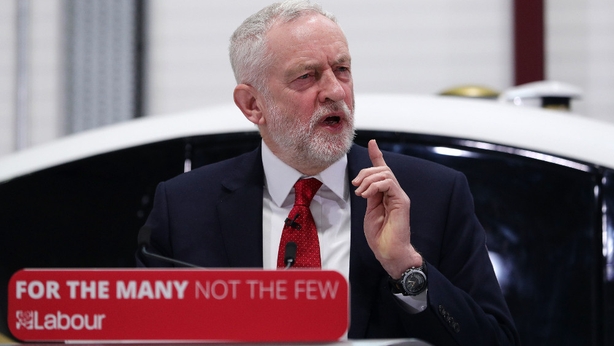Taoiseach Leo Varadkar and British Prime Minister Theresa May spoke by phone this evening to discuss Brexit and the EU's draft withdrawal agreement, which is due to be published this week.
A statement released by the Taoiseach said both he and Mrs May want the options, as set out in the December Joint Report, to be examined in detail.
"This would include the preferred option of a satisfactory solution to the border problem being found within the overall future relationship between the EU and the UK," the statement said.
"The Taoiseach also repeated the necessity from the EU side to have the detail of the backstop option of full regulatory alignment spelled out in the draft legal text of the Withdrawal Agreement. This option would only come into effect if agreement on one of the other options is not reached," it added.
It comes after British Labour party leader Jeremy Corbyn called for the UK to remain in a permanent customs union with the EU after Brexit.

Mr Corbyn called for Britain to keep tariff-free access to the EU after Brexit, arguing that withdrawal from the union is "what we make of it".
His announcement opens up a clear divide with Mrs May, who wants to be outside any customs union so Britain can sign free trade deals with countries around the world after leaving the EU.
Foreign Secretary Boris Johnson described Mr Corbyn's position as a "betrayal" of the Brexit vote and a "cynical" and "deluded" attempt to link up with Tory rebels to inflict a damaging defeat on the PM in an upcoming expected vote on a cross-party amendment calling for a customs union.
But Mr Corbyn said his call was "consistent" with Labour's position since the referendum, and an "appeal to MPs of all parties" to "put the people's interests before ideological fantasies" to protect jobs, living standards and the economy and avoid a hard border on the island of Ireland.
His intervention came as the British Cabinet prepared for a Thursday meeting where it will finalise the government's position ahead of a major Brexit speech from Mrs May on Friday.
Setting out Labour's policy at a speech in Coventry, Mr Corbyn said: "Every country, whether it's Turkey, Switzerland, or Norway that is geographically close to the EU, without being an EU member state has some sort of close relationship to the EU. Some more advantageous than others.
"And Britain will need a bespoke, negotiated relationship of its own."
He went on: "Labour would seek a final deal that gives full access to European markets and maintains the benefits of the single market and the customs union, as the Brexit Secretary David Davis promised in the House of Commons with no new impediments to trade and no new reduction in rights, standards and protections.
"We have long argued that a customs union is a viable option for the final deal so Labour would seek to negotiate a new, comprehensive UK-EU customs union to ensure there are no tariffs with Europe and to help avoid any need whatsoever for a hard border in Northern Ireland."
While Mr Johnson said the plan would leave Britain as a "colony" of the EU, Mr Corbyn insisted he would not countenance a deal that leaves Britain as a "passive recipient of rules decided elsewhere by others".
Labour would also demand the EU ensures the Government "has a say in future trade deals" signed by the bloc, but appeared to admit the UK would not be able to sign its own agreements.
"We do not believe that deals with the US or China, would be likely to compensate for a significant loss of trade with our trading neighbours in the EU, and the Government's own leaked assessments show that," he said.
On immigration, Mr Corbyn said free movement would end as a "statement of fact" after Brexit and committed to the "reasonable management of migration".
He said: "Every industry needs workers. There is a skills shortage in Britain and our National Health Service is already suffering because large numbers of EU staff have gone home because they are frightened of the future in Britain.
"We want to turn that around. They are welcome to stay, welcome to work here and we need their skills and we need their dedication to public service. Under Labour we will make sure that happens."
Mr Corbyn also suggested Labour would contribute to the Brussels budget to remain in EU agencies such as Euratom, which regulates nuclear materials, rather than "paying more" to duplicate them in the UK.
He also risked the ire of some of his own MPs, who want him to commit to remaining in the single market, by insisting Britain must leave so Labour can properly implement its plan for a government free from EU rules on state aid and competition.
In Brussels, Tánaiste Simon Coveney was holding talks with the EU's chief Brexit negotiator Michel Barnier.
The EU is expected to publish its "legal text" on the divorce agreement reached between the UK and Brussels in December later this week, which covered issues including the border in Ireland.
Mr Coveney said: "Commitments made in December between EU and UK must be clearly reflected in new legal text.
"EU solidarity remains strong with Ireland's concerns," he added.

